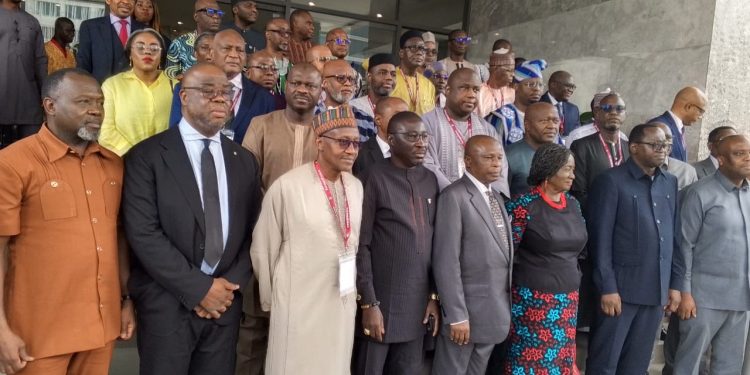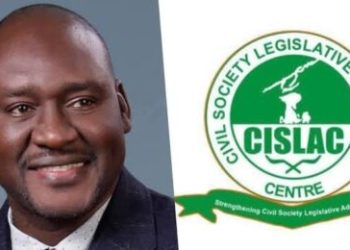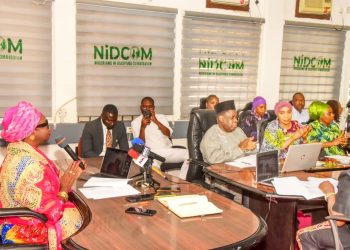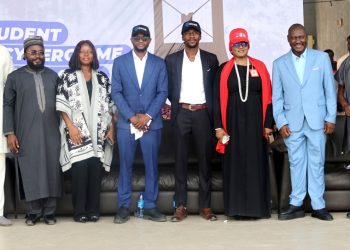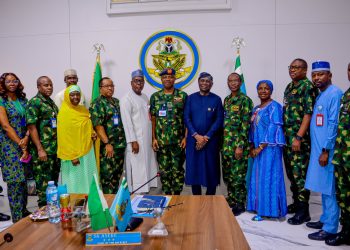By Nkechi Eze
In the face of growing regional complexities, economic insecurity, and political fragmentation, Ministers and high-level stakeholders from across West Africa convened in Accra, Ghana, on Saturday, July 19, 2025, for the 2nd Extraordinary Ministerial Committee Meeting of the Intergovernmental Action Group Against Money Laundering in West Africa (GIABA), to chart a collective course against money laundering, terrorism financing, and illicit financial flows across the region.
Hosted at the Palms by Eagles Hotel in Accra, the meeting brought together finance ministers, financial intelligence units, regulatory institutions, law enforcement agencies, and development partners under a single roof to address not only the technical architecture of anti-money laundering (AML) and countering the financing of terrorism (CFT), but also the wider geopolitical tensions threatening to erode regional cooperation, including the recent withdrawal of the Alliance of Sahel States (AES) Burkina Faso, Mali, and Niger from ECOWAS.
Ghana’s Vice President, Her Excellency Prof. Jane Naana Opoku-Agyemang, who delivered the keynote address on behalf of President John Dramani Mahama, set the tone for the discussions, calling for a renewed collective vision to address transnational threats in a rapidly evolving security and financial landscape.
“This is an opportunity for reflection and foresight,” the Vice President said. “Our regional institutions must be able to respond to emerging threats, adapt to new realities, and expand the frontiers of cooperation. The illicit flow of money thrives where coordination is weak and institutions are fragmented.”
Acknowledging the political transitions in parts of the region, she noted that while such developments have brought about governance challenges, they also serve as a timely reminder of the need for regional cohesion. “Discussions around deepening engagement with all parts of ECOWAS, including those currently in transition, take on renewed importance,” she said. “Our architecture for combating money laundering and terrorist financing must be robust, inclusive, and forward-looking.”
The Vice President underscored the need to go beyond mere policy conversations and commit to practical partnerships, saying, “Let this meeting serve not only as a forum for policy, but as a platform for partnership. Our shared challenges require shared solutions.”
Also speaking at the opening, the new Chair of the GIABA Ministerial Committee and Sierra Leone’s Minister of Finance, Hon. Sheku Fantamadi Bangura, echoed the urgency for collaborative reform. He paid glowing tribute to his predecessor, Nigeria’s Minister of Justice, Lateef Fagbemi, SAN, for what he described as “impeccable leadership,” while reaffirming his commitment to steering the Committee towards impactful decisions.
“Our core mission to safeguard member states’ financial systems against money laundering, terrorist financing, and proliferation financing has never been more vital,” Bangura stated. “The evolving landscape marked by cybercrime, maritime financial flows, and political realignments demands vigilance and adaptive strategies.”
He laid out four key pillars for GIABA’s forward strategy: enhanced regional cooperation, targeted capacity-building, robust intelligence sharing, and sustained political commitment. “None of these measures will succeed without unwavering political commitment at the highest levels,” he warned. “We must shift from technical compliance to demonstrable effectiveness.”
Bangura further noted that regional security cannot be treated as an isolated problem within a few member states. “These threats transcend borders and political divides,” he said. “Only through sustained partnerships and collective resolve can we build a secure and resilient West Africa.”
The ECOWAS Resident Representative, Ambassador Mohammed Lawan Gana, delivering his remarks on behalf of the President of the ECOWAS Commission, Dr. Omar Alieu Touray, acknowledged the difficult context in which the meeting was taking place. He cited the corrosive impacts of violent extremism, the rise of organized crime, and the institutional challenges posed by the exit of AES members from ECOWAS.
“In an era of rapid globalization and digital financial flows, money laundering and terrorist financing have become more complex, more damaging, and more persistent,” Gana stated. “They erode governance, fund violence, and threaten regional integration.”
Ambassador Gana emphasized that GIABA’s work, particularly its mutual evaluation reports and typology studies on illicit financial flows, remains central to ECOWAS’ Vision 2050, aimed at building a secure, integrated, and prosperous West Africa. However, he cautioned that institutional efficiency alone would not suffice.
“We must look inward and address the root causes of illicit financial flows, weak governance, endemic corruption, lack of transparency, and the erosion of national values,” he noted. “Political will, public engagement, and effective implementation strategies must complement our technical work.”
On the matter of the AES withdrawals, Gana struck a conciliatory tone. “The threats we face are common; our responses must also be common,” he said. “Political divorce must never become economic or security disengagement. We must build bridges where others are tempted to erect walls.”
He reaffirmed ECOWAS’ continued commitment to dialogue, noting that the Authority of Heads of State had recently appointed a Chief Negotiator to engage Burkina Faso, Mali, and Niger in constructive talks aimed at managing their withdrawal in a way that safeguards regional security and citizen welfare.
The Director General of GIABA, Edwin W. Harris Jr., also took the opportunity to commend member states for progress made under the second round of mutual evaluations, while urging them to recommit to the principles of FATF compliance and regional synergy.
Development partners from institutions such as the World Bank, the Financial Action Task Force (FATF), and the African Development Bank (AfDB) were also present and pledged continued technical and financial support for strengthening West Africa’s AML/CFT frameworks.
As the meeting transitioned into technical sessions, ministers and national AML/CFT coordinators turned their focus to pending issues such as the review of GIABA’s 2025–2030 Strategic Plan, regional typology reports on new financial crime threats, and most crucially, deliberations on whether Burkina Faso, Mali, and Niger will retain membership status within GIABA, even after their ECOWAS departure.
As one official noted in a private conversation on the sidelines: “GIABA may now be the last institutional thread tying all 15 ECOWAS countries together. The stakes are not just regulatory; they are existential.”
The Accra session marked not just another meeting, but a pivotal moment in West Africa’s journey to protect its economies, its societies, and its integration project from the corrosive power of financial crime. Whether through policy alignment, institutional dialogue, or grassroots cooperation, the resolve of GIABA and its ministerial committee may well determine the region’s trajectory in the years ahead.
The outcomes of the Ministerial deliberations are expected to be released in a formal communiqué at the close of the session.


